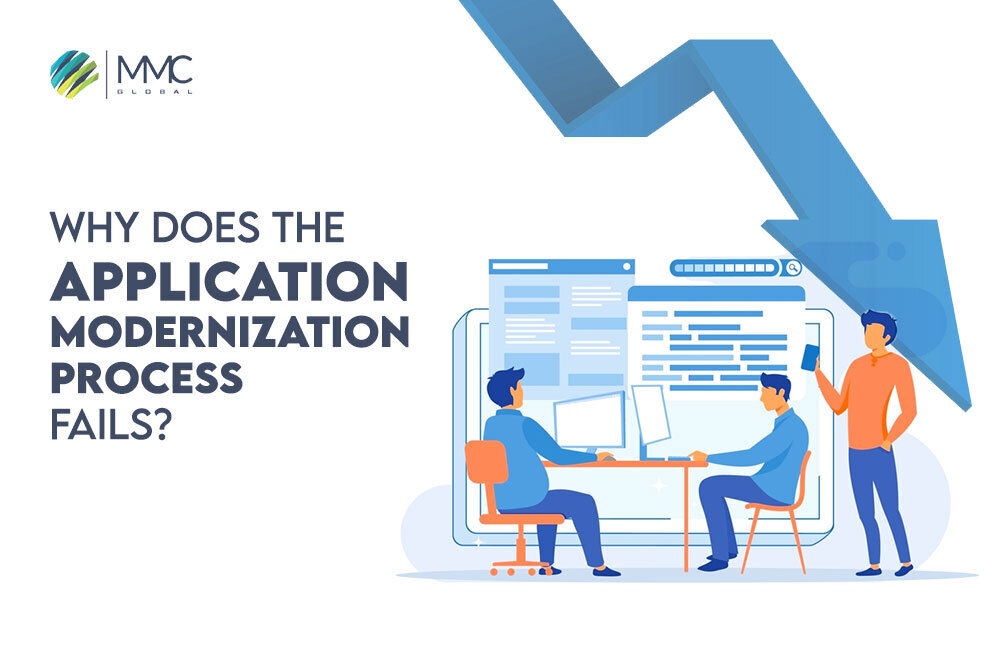Why Does the Application Modernization Process Fails: 5 Reasons That You Need To Know


Application modernization is quite effective in improving business processes. It gives your business a new shape that makes you market competitive. The origin of app modernization starts with apps that have been integrated into your current business process. However, the old system can contain outdated features, databases, user interfaces, and other obstacles that are difficult to handle within the legacy environment. Those apps refer as legacy application system that needs to update.
The strategy of application modernization or updating them into newer software may prolong the application’s life span. Although some of the applications require whole development from scratch, and some need a replacement of major components.
It is an important aspect where many businesses fail to determine what better do and where we need to invest. Similarly, there are so many setbacks we have observed while staying in this industry.
At MMCGBL, we first concentrated on consulting businesses to choose the best option. Our process of handling customers is first to make them aware of the market. And then suggest to them the best app modernization technology.
Since we have been dealing with our clients, we have observed a few of the challenges that lead businesses in the wrong direction. Let’s get straight to them.

5 Major Reasons Of Why Application Modernization Fails
App modernization is updating an application with the latest technology and updated database. Before starting application modernization, you must make a strategy that helps you escape pitfalls. Otherwise, it will not only waste your time but your money as well.
Neglecting Business Process
Businesses sometimes fail to determine their root cause before implementing new processes. The poor business process will not streamline any newly developed automation. Determine where business is lacking and identify the scope of implementing app modernization that will lead you in the right direction.
Read More: 6 Steps Legacy Application Modernization Strategy for Digital Transformation
Forcefully Implementing the New Applications
It is difficult to embrace entirely new applications for employees or customers that may not support and adopt recent changes instantly. Sometimes, conducting in-depth research may affect the whole business ecosystem badly, and owners only realize it once they get stuck.
Wrong Assumptions and Lack of Research
Businesses that hurriedly want to change the legacy system into modernized applications without any strategy and consultation are doing wrong. There may be a need for a whole app revamp, or maybe not. It is uncertain to know without conducting research or come with a valid reason for application modernization.
Lack of Business Alignment
App modernization projects must be aligned with the organization’s overall business goals to succeed. It is important to ensure that the project is aligned with the organization’s overall strategy, objectives, and priorities. In addition, it helps ensure that the project is properly funded and supported and that its benefits are aligned with the organization’s needs.
Underestimation of Complexity
Modernizing an application can be complex and challenging, and many organizations underestimate the effort to complete the project. Factors such as legacy code, outdated infrastructure, and limited resources can make the process even more difficult. It is important to assess the project’s complexity thoroughly and have a clear understanding of the resources and budget required to complete it.
Resistance to Change
Change can be difficult, and employees may resist modernizing an application they have been using. It is important to educate employees on the project’s benefits and involve them in the process to ensure that they are on board and supportive of the effort.
Technical Challenges
Technical challenges such as compatibility issues, data migration, and security concerns can arise during app modernization. It is important to identify these challenges early and have the plan to address them. A thorough assessment of the technical landscape, including a review of legacy systems and infrastructure, can help identify potential challenges and ensure that they are properly addressed.
Lack of Skills and Expertise
The technology landscape is constantly changing, and it can be difficult for organizations to keep up with the latest trends and developments. A lack of skills and expertise can be a major barrier to successful application modernization. Moreover, investing in training and development is important to ensure that employees have the necessary skills and knowledge to complete the project.
Read More: Six Important Advantages of Application Modernization In Business
Conclusion
App modernization is a critical part of digital transformation, but it is not without its challenges. By understanding the major reasons why app modernization projects fail, organizations can take steps to mitigate these risks and ensure that their projects are successful.
By aligning the project with overall business goals, assessing the complexity of the project, overcoming resistance to change, addressing technical challenges, and investing in skills and expertise, organizations can successfully modernize their applications and reap the benefits of digital transformation.



